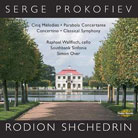April 2008
Prokofiev, after composing his Five Songs (all as vocalise -- i.e., without text), arranged all of them for violin and piano, and No. 2 alone for cello and orchestra. Raphael Wallfisch asked Shchedrin to orchestrate the four others, and introduced the set in London a year ago. This is agreeably lyric material, splendidly performed, an effective contrast with the other concerted works here. Prokofiev’s Concertino, left unfinished at the time of his death, was completed by his pupil Rostropovich, and then orchestrated by Dmitri Kabalevsky. This new recording, however, appears to be the first to use the much more recent (1993) edition by Vladimir Blok, whose orchestra is conspicuously smaller than Kabalevsky’s. Both versions are attractive: This one has the advantage of being packaged with Shchedrin’s remarkable Parabola. Walfisch is a persuasive advocate for all these concerted pieces, in which Simon Over and the London players are more than mere accompanists. Their performance of the Classical Symphony, though, is not in the same class -- it has awkward balances and simply lacks character -- but the three less familiar titles, and Nimbus’s excellent, well-detailed sound, make this disc definitely worthwhile. GO BACK TO: |
 Prokofiev - Cinq Mélodies, Op. 35,
arr. Prokofiev & Shchedrin; Concertino for Cello and Orchestra; Classical Symphony; Shchedrin
- Parabola concertante
Prokofiev - Cinq Mélodies, Op. 35,
arr. Prokofiev & Shchedrin; Concertino for Cello and Orchestra; Classical Symphony; Shchedrin
- Parabola concertante